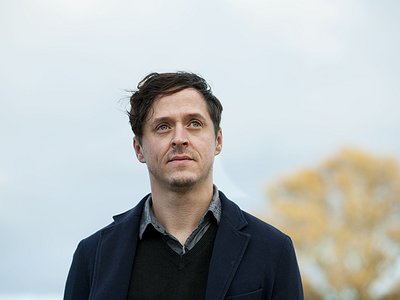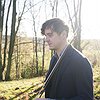Part 2
With more and more musicians creating than ever and more and more of these creations being released, what does this mean for you as an artist in terms of originality? What are some of the areas where you currently see the greatest potential for originality and who are some of the artists and communities that you find inspiring in this regard?
It's very true that there are more and more musicians but I think that in the process of writing a piece and giving enough room for it to develop and breathe, that the originality will come through. There can be a tendency to want to rush releases and albums, in our culture of immediacy, so resisting this allows the creative journey of a piece or body of work to develop unfettered, giving way to a more unique sound. I also believe it’s okay to sense an influence in an artist's work removing the false notion that everything you create must be utterly unique and never heard before. I’m starting to find that real originality comes from trust in allowing others into your creative process, whether as musicians or others ideas, often in the areas of improvisation. I love Andrew Norman’s piece "Music in Circles" which I feel sounds like the freedom of expression and originality encapsulated in a very intentional piece of music arranging. It has moments of great excitement and sadness all within the same cascade of instruments. I believe many composers and bands are pushing boundaries such as Christopher Tignor with his attention to processing live performance sounds. I guess here the listener experiences something utterly unique, different perhaps in each performance. I have always appreciated Radiohead and their continually developing sound. Their own solo releases have progressed so much and I think that as they come back together for the next album it could be something really special.
How strictly do you separate improvising and composing?
I don’t!
How do you see the relationship between sound, space and composition and what are some of your strategies and approaches of working with them?
The space where music is recorded or performed can define the music completely. It changed A Certain Tide in terms of broadening the album which up till then felt quite a close and intimate album, all because of the performance hall we used and the feeling and overall sound that then gave the album. For me it’s quite important to take music into new environments, especially at the recording stage, to give the sound a home. I often use this approach, trying a new space to record in for new projects. I also enjoy working in post-production on a work in the studio environment, where the focus shifts from capturing to refining sounds and it is here where there is a renewed sense of ownership of the music where finite decisions are made. I particularly enjoy working with James at Masterlink studios in this stage of the recording.
What's your perspective on the relationship between music and other forms of art – painting, video art and cinema, for example – and for you and your work, how does music relate to other senses than hearing alone?
I studied Art at college and university and have worked in the context of Photography education for a while which has an inherent relationship with my music. For this reason I like to look for work that says something similar to the music, best seen in the last two releases adorned by Heather Polley’s photography. The image she takes is already beautifully considered behind the lens but is further developed as she uses film or Polaroid techniques that process the image into chocolate or cyan tones or abstractions where the image distorts. A similar approach is used in my music where uncontrolled elements have an impact on a piece such as improv sections or the venue and how it’s been recorded. I love how the moving image can give another dimension to the music and have worked with modern dance in the Abraham video to further explore this. I’d like to look at working with stop-motion animation for a video for a track from A Certain Tide as I love this artform.
What's your view on the role and function of music as well as the (e.g. political/social/creative) tasks of artists today - and how do you try to meet these goals in your work?
I believe music is a wonderful mystery in the sense that it means so much to us and can lead us through a plethora of emotions. I find it has the power to comfort, excite, empathise or destruct. There is definitely something sacred and universal about sound and how its waves can be arranged so they bypass what is seen to affect what is unseen. I’ve come to realise the strong spiritual reality of music and how artists have an unbelievable gift to create, that is to bring something as yet unheard into existence. It seems important to me that as artists we continue to discover our individual song and don’t apologise for making and releasing it. Music is also about the heart and what’s inside, for me it’s inseparable from creation and the Creator. I attempt to communicate something of the wonder and sacred nature of life in the writing process, which means trusting the stuff that’s inside that I’m coming out with; a lesson which I’m continually learning!
Listening is also an active, rather than just a passive process. How do you see the role of the listener in the musical communication process?
As an avid music fan, I see the role of the listener as the one who completes the process. Listening is like being a sponge and soaking up everything that’s there. It is also true that the listener has their own interpretation and reading of the music as it sign-posts more about what the listener feels in response to the music as well as what the writer is wanting to say. Certainly, it feels with instrumental music as if it is a gift to the listener, as there is so much space for interpretation. As a listener I also feel a sense of purpose in passing on or recommending music that has had an impact on me. The Internet has made this possible as music can be heard and shared across the globe without much manipulation. I also reckon music is always best heard live at gigs. As a listener I’m always hoping to see my favourite acts live and as a writer always working towards the same goal, it is in the live setting that the two roles meet and immediate responses and possibilities are born.
Reaching audiences usually involves reaching out to the press and possibly working with a PR company. What's your perspective on the promo system? In which way do music journalism and PR companies change the way music is perceived by the public?
In essence I feel there is nothing wrong with promoting music and rallying people to your cause, I certainly have had a good experience with some types of promotion. Essentially, all artists need someone who believes in them and what they’re producing. I’m not entirely confident that the wider public is fed a fair representation of music from all levels and genres but it has never been easier to discover emerging or any music being made anywhere on the planet, or to have immediate contact with fans from all over the world.
Do you have a musical vision that you haven't been able to realise for technical or financial reasons – or an idea of what music itself could be beyond It's current form?
YES! I have many dreams here in terms of live performance and recording projects, collaborations and travelling with my music, some of these are becoming plans and some may have to wait. Sometimes whilst walking or going about daily business, I have a snippet of a vision - a sound being made and hear it too, it can be fleeting but I’ll recall it somehow and seek out that sound. For music beyond It's current form, I’m not sure but I’ve recently heard about your own DNA code being translated into song form which would be utterly unique for every living thing. That's pretty exciting.
Find out more about Tiny Leaves on the project's homepage – or listen to the music on bandcamp.






